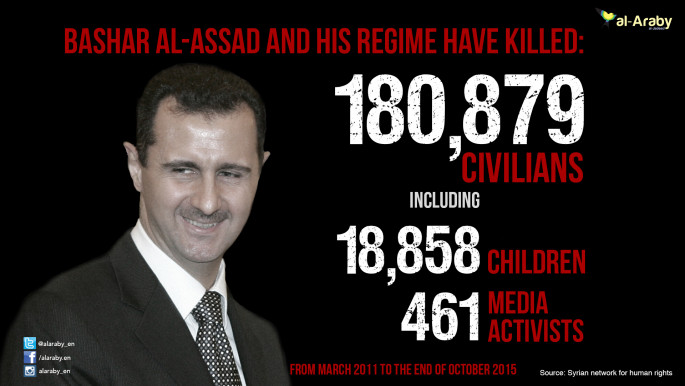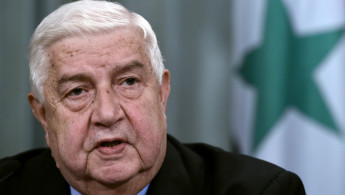Syrian government ready to attend peace talks in Geneva
Bashar al-Assad's government announced on Saturday it is ready to attend peace talks later this month with the opposition in Geneva.
4 min read
Syrian FM Walid al-Moallem said Damascus wants to see lists of opposition groups attending [Getty]
The Syrian government announced on Saturday it is ready to attend peace talks later this month with the opposition in Geneva, as a new airstrike in northern Syria killed and wounded scores of people, including many militants.
But Foreign Minister Walid al-Moallem said Damascus also wants to see lists of the opposition groups who will attend and ensure that "terrorist" groups will not be represented.
State news agency SANA said al-Moallem made his comments on Saturday while meeting in Damascus with UN envoy Staffan de Mistura.
Al-Moallem's comments came shortly before opposition activists said an airstrike had killed at least 39 and wounded dozens of others.
The Britain-based Syrian Observatory for Human Rights said 39 people were killed, including many fighters from al-Qaida's affiliate in Syria, the Nusra Front, as well as detainees in the northwestern town of Maaret al-Numan.
It said the targeted area included a jail and a courthouse run by Nusra Front.
The Nusra Front is one of the country's most powerful factions and is opposed to peace talks with the government, saying its aim is to step up an Islamic state in Syria.
The group is fighting against government forces, the Islamic State group as well as some US-backed rebel factions.
Much like its rival, the Islamic State group, the Nusra Front imposes its own vision of Islamic Shariah law in territories it controls — including Islamic courts and prisons.
The Syrian government has been carrying out airstrikes for years, which activists say have killed thousands of people.
Russia began its own air campaign on September 30 saying its airstrikes are meant to weaken the Islamic State group and other "terrorists" in Syria.
The Local Coordination Committees, another activist group, said the airstrike killed 51.
The group posted a photo on its Facebook page showing several bodies covered with blankets and lined on a pavement.
Another showed two dead bearded young men being loaded into an ambulance.
Syria-based activist Hadi Abdallah wrote on his Twitter account that the air raid killed 43 and wounded more than 100, claiming it was carried out by Russian aircraft.
The "terrifying massacres was carried out by Russian warplanes," Abdallah wrote, without saying why he believed they were Russian.
Conflicting casualty figures are common in the aftermath of airstrikes in Syria.
The Observatory said the warplanes fired four missiles that hit the Islamic court, which includes a jail, as well as a nearby road linking the court with a market.
De Mistura arrived in Beirut later Saturday and boarded a plane heading to Qatar, airport officials said in Beirut on condition of anonymity in line with regulations.
He arrived in Syria on Friday and earlier this week, he met Syrian opposition officials in Saudi Arabia — a main backer of some of the rebel groups trying to remove President Bashar al-Assad from power.
A statement Saturday from De Mistura's office described his meeting with al-Moallem as "useful" and said the UN envoy is "looking forward to the active participation of all relevant parties" in the upcoming talks.
The Syrian government refers to all those battling to overthrow Assad as terrorists and has said the talks should focus on battling terrorism.
The opposition wants Assad to step down as part of any peace deal.
The UN is urging the two sides to meet January 25 in an effort to end the conflict, which has killed more than 260,000 people and caused a massive refugee crisis.
Conferences in Geneva in 2014 failed to bring about a settlement, though this round is seen as particularly urgent after the UN Security Council passed a resolution last month endorsing a transitional plan for Syria.
The Syrian opposition is demanding some gestures by the government ahead of the talks including lifting sieges imposed on rebel-held areas, releasing some detainees and ending airstrikes.
Also on Saturday, International Committee of the Red Cross spokesman Pawel Krzysiek told The Associated Press that aid convoys could reach the rebel-held border town of Madaya on Monday.
The town has been under siege since July and the government said it will allow aid to flow inside.
Krzysiek added that aid won't be able to reach Madaya and the two besieged northern Shia village of Foua and Kfarya before Monday "for logistical reasons."
"Right now, preparations are underway. We are loading the trucks and sending the movement notifications," Krzysiek said.
But Foreign Minister Walid al-Moallem said Damascus also wants to see lists of the opposition groups who will attend and ensure that "terrorist" groups will not be represented.
State news agency SANA said al-Moallem made his comments on Saturday while meeting in Damascus with UN envoy Staffan de Mistura.
Al-Moallem's comments came shortly before opposition activists said an airstrike had killed at least 39 and wounded dozens of others.
The Britain-based Syrian Observatory for Human Rights said 39 people were killed, including many fighters from al-Qaida's affiliate in Syria, the Nusra Front, as well as detainees in the northwestern town of Maaret al-Numan.
It said the targeted area included a jail and a courthouse run by Nusra Front.
The Nusra Front is one of the country's most powerful factions and is opposed to peace talks with the government, saying its aim is to step up an Islamic state in Syria.
The group is fighting against government forces, the Islamic State group as well as some US-backed rebel factions.
Much like its rival, the Islamic State group, the Nusra Front imposes its own vision of Islamic Shariah law in territories it controls — including Islamic courts and prisons.
The Syrian government has been carrying out airstrikes for years, which activists say have killed thousands of people.
Russia began its own air campaign on September 30 saying its airstrikes are meant to weaken the Islamic State group and other "terrorists" in Syria.
The Local Coordination Committees, another activist group, said the airstrike killed 51.
The group posted a photo on its Facebook page showing several bodies covered with blankets and lined on a pavement.
Another showed two dead bearded young men being loaded into an ambulance.
Syria-based activist Hadi Abdallah wrote on his Twitter account that the air raid killed 43 and wounded more than 100, claiming it was carried out by Russian aircraft.
The "terrifying massacres was carried out by Russian warplanes," Abdallah wrote, without saying why he believed they were Russian.
Conflicting casualty figures are common in the aftermath of airstrikes in Syria.
The Observatory said the warplanes fired four missiles that hit the Islamic court, which includes a jail, as well as a nearby road linking the court with a market.
De Mistura arrived in Beirut later Saturday and boarded a plane heading to Qatar, airport officials said in Beirut on condition of anonymity in line with regulations.
He arrived in Syria on Friday and earlier this week, he met Syrian opposition officials in Saudi Arabia — a main backer of some of the rebel groups trying to remove President Bashar al-Assad from power.
A statement Saturday from De Mistura's office described his meeting with al-Moallem as "useful" and said the UN envoy is "looking forward to the active participation of all relevant parties" in the upcoming talks.
The Syrian government refers to all those battling to overthrow Assad as terrorists and has said the talks should focus on battling terrorism.
The opposition wants Assad to step down as part of any peace deal.
The UN is urging the two sides to meet January 25 in an effort to end the conflict, which has killed more than 260,000 people and caused a massive refugee crisis.
Conferences in Geneva in 2014 failed to bring about a settlement, though this round is seen as particularly urgent after the UN Security Council passed a resolution last month endorsing a transitional plan for Syria.
The Syrian opposition is demanding some gestures by the government ahead of the talks including lifting sieges imposed on rebel-held areas, releasing some detainees and ending airstrikes.
Also on Saturday, International Committee of the Red Cross spokesman Pawel Krzysiek told The Associated Press that aid convoys could reach the rebel-held border town of Madaya on Monday.
The town has been under siege since July and the government said it will allow aid to flow inside.
Krzysiek added that aid won't be able to reach Madaya and the two besieged northern Shia village of Foua and Kfarya before Monday "for logistical reasons."
"Right now, preparations are underway. We are loading the trucks and sending the movement notifications," Krzysiek said.
 |
|





 Follow the Middle East's top stories in English at The New Arab on Google News
Follow the Middle East's top stories in English at The New Arab on Google News


